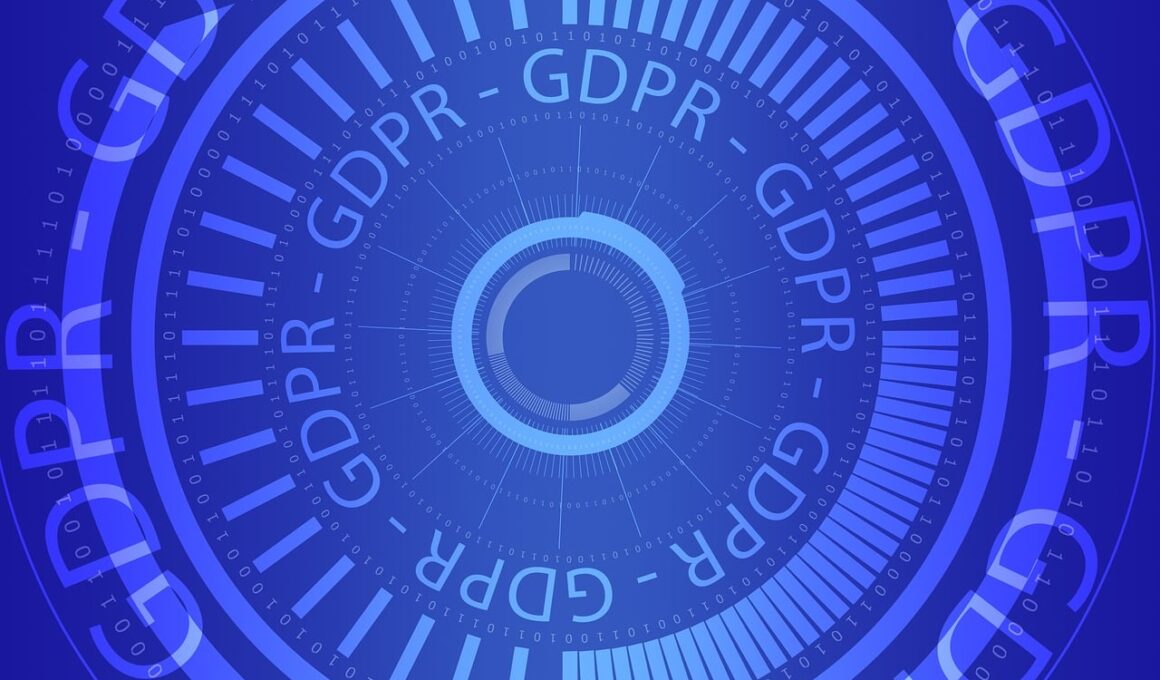How GDPR Impacts Marketing Ethics and Consumer Privacy
The General Data Protection Regulation (GDPR) has transformed how companies approach marketing by emphasizing ethical practices and safeguarding consumer privacy. This substantial regulatory framework, enforced since May 2018, necessitates businesses to adopt transparent data-handling processes while requiring explicit consent from individuals before collecting their personal information. Consequently, marketers must rethink their tactics, ensuring they prioritize customer trust and their opinions about how data is managed. Implementing ethical marketing principles begins with understanding consumers’ rights regarding their data, including the right to access, rectify, and delete information. By prioritizing ethical considerations, businesses can forge deeper connections with their audiences. Upholding these principles builds brand loyalty and encourages responsible data usage that aligns with consumer expectations. Heightened awareness regarding data privacy and security helps in developing effective marketing strategies that not only comply with regulations but also respect individual preferences. In moving forward, marketers can leverage ethical practices to differentiate themselves in crowded markets. This necessitates investing in training and resources to ensure that marketing teams are well-educated about compliance requirements under GDPR, ultimately positioning companies as leaders in ethical marketing.
When discussing GDPR, one must also consider how it has greatly affected consumer expectations surrounding data privacy. Today’s consumers are more informed and concerned about how companies use their data. As a result, they demand greater transparency, control, and accountability from businesses. This shift in mindset forces companies to reevaluate their marketing strategies, focusing more on ethical data practices to build trust with their customers. Research indicates that brands that prioritize consumer privacy are more likely to retain and attract customers. As a result, some organizations are capitalizing on this shift by promoting their commitment to data ethics, showcasing their transparency in data handling. Adopting ethical data policies also involves redefining marketing messages to assure consumers that their data is safe and utilized only for specified purposes. Marketers can use channels such as social media and email campaigns to communicate these commitments effectively. Furthermore, offering consumers choices regarding their data can empower them and help in establishing a more ethical relationship between brands and their audience. This empowerment is pivotal in not just compliance with GDPR but in creating a competitive advantage in today’s data-driven marketplace.
Challenges in Implementing GDPR Compliance
Despite its numerous benefits, implementing GDPR compliance poses significant challenges for many businesses. The requirement to establish rigorous data management protocols can be overwhelming, particularly for smaller organizations with limited resources. Achieving a comprehensive understanding of consumers’ privacy rights and ensuring adherence to GDPR can be complex and time-consuming. One major obstacle is the need to update existing marketing databases to ensure compliance, which may involve considerable investments in data mapping and auditing processes. Many brands are left grappling with how to obtain and document explicit consent from consumers effectively. Moreover, businesses must ensure they stay up to date with evolving regulations and guidelines, which can change as technology and consumer expectations evolve. Achieving a balance between profitability and ethical data use is crucial to overcome these challenges. Organizations can make informed decisions that align with GDPR and support their overall objectives by investing in appropriate training for their personnel. This will create an organizational culture focused on respecting consumer privacy, resulting in enhanced customer satisfaction and loyalty over time.
In light of GDPR regulations, marketing tactics have undergone significant shifts toward personalization, while maintaining a foundation of ethical practice and respecting consumer privacy. Personalized marketing has become a critical aspect of modern strategies, as brands strive to deliver tailored experiences to their audiences. However, the challenge lies in obtaining and using consumer data responsibly. GDPR mandates specific guidelines for data collection and processing, compelling marketers to prioritize consent and minimize the data used for personalization. This has resulted in a push for more qualitative consumer insights rather than relying solely on quantitative data. Marketers must learn to navigate the complexities of consumer preferences while adhering to GDPR requirements. Brands that understand the importance of responsible data use can stand out in a competitive landscape. By leveraging anonymized data and conducting thorough analysis, businesses can still develop effective marketing strategies geared toward customer needs without infringing on privacy rights. As a result, ethical personalization can improve consumer engagement and satisfaction, reinforcing the idea that respecting privacy and delivering value can coexist harmoniously in the ever-evolving digital marketing space.
Future Trends in Marketing Ethics and Privacy
As we look ahead, it is evident that the impact of GDPR will continue to shape marketing ethics and consumer privacy well into the future. Companies need to remain vigilant in their approach to data management, particularly as new technologies emerge. Artificial intelligence and machine learning are increasingly influencing how data is analyzed and utilized, raising ethical questions about privacy and bias. Marketers must balance the opportunities presented by these advancements with their commitment to transparent and ethical practices. Moreover, the importance of diversity and inclusion in marketing strategies is gaining traction, emphasizing the need for organizations to consider various perspectives when addressing consumer privacy issues. By fostering an inclusive approach, brands can build better relationships with their audience and establish themselves as advocates for privacy rights. Emerging technologies such as blockchain might also play a pivotal role in enhancing data security and empowering consumers to control access to their information. This evolution calls for continual learning and adaptation, ensuring marketers stay informed about changing regulations and consumer expectations. Additionally, fostering collaborations between stakeholders in the marketing ecosystem can lead to comprehensive solutions that uphold privacy and ethics in digital marketing.
In conclusion, the influence of GDPR on marketing ethics and consumer privacy cannot be understated. By emphasizing consumer rights and enforcing transparency, GDPR fosters a more responsible marketing landscape that aligns with consumer expectations. Modern marketers must navigate a dynamic environment that demands ethical practices while harnessing the power of data for effective advertising. As businesses prioritize compliance and responsible data use, the potential for ethical marketing practices to enhance brand reputation and foster loyalty increases. However, organizations must be agile and responsive to ongoing regulatory changes and consumer sentiments regarding privacy. Establishing a strong ethical framework within marketing strategies not only benefits consumers but also positions brands as forward-thinking, responsible entities in their respective industries. The success of these efforts relies on continued investment in consumer education and proactive adaptation to emerging technologies. As marketers look toward the future, remaining committed to ethical data practices will be essential in thriving within a regulatory landscape that constantly evolves. Hence, strengthening relationships built on trust and transparency will ultimately lead to sustainable business success and consumer satisfaction.
To emphasize the importance of retaining consumer trust, companies must routinely evaluate and adapt their marketing practices according to evolving privacy expectations. Consistent communication regarding data usage plans, combined with transparent privacy policies, can mitigate consumer apprehension. By engaging consumers in dialogue and addressing their concerns, businesses can cultivate an environment that promotes ethical marketing. Furthermore, companies can leverage feedback loops, integrating consumer insights to inform decisions and enhance their ethical approaches. Balancing commercial objectives with responsible data practices is key to fostering consumer loyalty in an increasingly complex marketplace. By prioritizing consumer privacy and actively demonstrating ethical commitment, organizations can set themselves apart from competitors. In this regard, affiliate partnerships can also be utilized to reinforce ethical marketing practices. Collaborating with like-minded brands can amplify efforts to maintain ethical standards within marketing campaigns. As companies navigate through the complexities of GDPR, creating a culture that values and respects consumer privacy will ultimately define long-term success in the industry. Given the rapid evolution of technology and emerging challenges, maintaining an open channel for discussions about privacy concerns will help businesses nurture and retain consumer trust in their brand.
Finally, embracing a proactive approach to GDPR compliance offers a pathway for brands to connect meaningfully with consumers while adhering to legal obligations. By viewing compliance as an opportunity for growth, organizations can strengthen their reputation and enhance consumer loyalty. Focusing on transparency and customer-centric practices leads to a better understanding of consumer needs and preferences, moving beyond mere compliance. Strategies that prioritize ethical marketing during data collection and utilization promise meaningful engagement while respecting privacy rights. Organizations embracing this perspective will be better positioned to adapt and thrive in an evolving regulatory landscape. Additionally, it gears marketing efforts towards building authentic relationships with customers, which ultimately fosters long-lasting loyalty. By utilizing technology responsibly, brands can enhance their offerings and address consumer pain points in ways that abide by ethical standards. As policies and regulations continue to evolve, remaining steadfast in commitment to ethical data practices is a shared responsibility across every aspect of a marketing operation. Adopting this mindset opens possibilities for innovation while ensuring consumer privacy remains at the forefront of marketing efforts.


